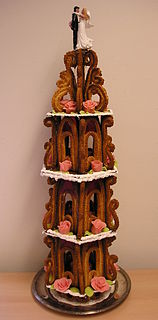
Confectionery is the art of making confections, which are food items that are rich in sugar and carbohydrates. Exact definitions are difficult. In general, however, confectionery is divided into two broad and somewhat overlapping categories: bakers' confections and sugar confections. The occupation of confectioner encompasses the categories of cooking performed by both the French patissier and the confiseur.

A lamington is an Australian cake made from squares of butter cake or sponge cake coated in an outer layer of chocolate sauce and rolled in desiccated coconut. The thin mixture is absorbed into the outside of the sponge cake and left to set, giving the cake a distinctive texture. A common variation has a layer of cream or strawberry jam between two lamington halves.

The Sydney Morning Herald (SMH) is a daily compact newspaper published in Sydney, New South Wales, Australia, and owned by Nine. Founded in 1831 as the Sydney Herald, the Herald is the oldest continuously published newspaper in Australia and "the most widely-read masthead in the country." The newspaper is published in compact print form from Monday to Saturday as The Sydney Morning Herald and on Sunday as its sister newspaper, The Sun-Herald and digitally as an online site and app, seven days a week. It is considered a newspaper of record for Australia. The print edition of The Sydney Morning Herald is available for purchase from many retail outlets throughout the Sydney metropolitan area, most parts of regional New South Wales, the Australian Capital Territory and South East Queensland.

The Queanbeyan Age is a weekly newspaper based in Queanbeyan, New South Wales, Australia. It has had a number of title changes throughout its publication history. First published on 15 September 1860 by John Gale and his brother, Peter Francis Gale, The Golden Age, as it was known at the time, was the first newspaper of the small township on the banks of the Queanbeyan River. It was named due to the short-lived Kiandra goldrush, which generated large amounts of gold-based traffic through the region.

Liquorice or licorice is a confection usually flavoured and coloured black with the extract of the roots of the liquorice plant Glycyrrhiza glabra. A wide variety of liquorice sweets are produced around the world. In North America, black liquorice is distinguished from similar confectionery varieties that are not flavoured and coloured black with liquorice extract but commonly manufactured in the form of chewy ropes or tubes. Black liquorice, together with anise extract, is also a common flavour in other forms of confectionery such as jellybeans. In addition to these, various other liquorice-based sweets are sold in the United Kingdom, such as liquorice allsorts. Dutch and Nordic liquorice characteristically contains ammonium chloride instead of sodium chloride, prominently so in salty liquorice.
The Carji Greeves Medal is a name given in recent decades to an Australian rules football award given to the player(s) adjudged best and fairest for the Geelong Football Club for the season. The voting system as of the 2017 AFL season, consists of the senior coach, director of coaching and the assistant coaches rating each player out of 15 after every game. The combined votes are averaged to give a final score for that game. To ensure players are not disadvantaged by injury, only a player's highest scoring 21 games count.
Sir Roy Burman Grounds was one of Australia's leading architects. His earlier work incorporated the Moderne movement - the international style of Art Deco architecture of the 1930s - with later buildings such as the National Gallery of Victoria and the adjacent Victorian Arts Centre, cementing his legacy as a leader in Australian architecture.

Neil Anthony Brown QC is a former Australian politician. He was deputy leader of the Liberal Party and deputy opposition leader from 1985 to 1987, under John Howard. He served as Minister for Employment and Youth Affairs (1981–1982) and Minister for Communications (1982–1983) in the Fraser Government.
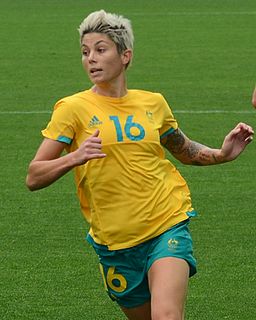
Michelle Pearl Heyman is an Australian soccer player and commentator who currently plays for Canberra United in the W-League in Australia. She became the all-time record goalscorer in the W-League in March 2021, after scoring her 73rd goal. She has previously played for W-League teams Central Coast Mariners, Sydney FC, and Adelaide United as well as the Western New York Flash in the American National Women's Soccer League. Heyman has represented Australia since 2010, playing at the 2014 AFC Women's Asian Cup, the 2015 FIFA Women's World Cup and the 2016 Summer Olympics. In May 2019 she retired from international football.

The Sydney Mail was an Australian magazine published weekly in Sydney. It was the weekly edition of The Sydney Morning Herald newspaper and ran from 1860 to 1938.
The 2011–12 season was the fourth season that Melbourne Victory competed in the Australian W-League. The team finished fourth for the second time in two seasons and was eliminated in the semi-finals by eventual champions Canberra United.
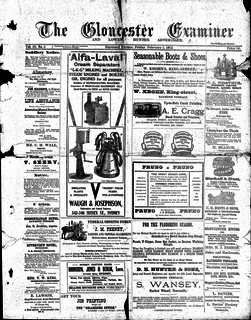
The Port Stephens Examiner is a weekly newspaper published in Raymond Terrace, New South Wales, Australia since 1893. The Port Stephens Examiner has also been published as the Gloucester Examiner and Lower Hunter Advertiser and the Raymond Terrace Examiner and Lower Hunter and Port Stephens Advertiser.
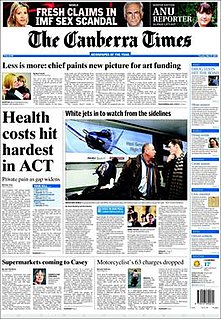
The Canberra Times is a daily newspaper in Canberra, Australia, which is published by Australian Community Media. Founded in 1926, the newspaper converted from broadsheet to tabloid format in 1956.
The Wellington Times is a newspaper published in Wellington, New South Wales, Australia since 1889. The Wellington Times has also been published as The Wellington Times and Australian Industrial Liberator.

Enlighten Canberra is an outdoor annual art and cultural festival held in Canberra, Australia featuring illuminating light installations and projections, performances from local and interstate musicians, a short film festival and the Canberra Balloon Spectacular.
Tim the Yowie Man is an Australian writer, author and cryptonaturalist who was born in Canberra, Australian Capital Territory.
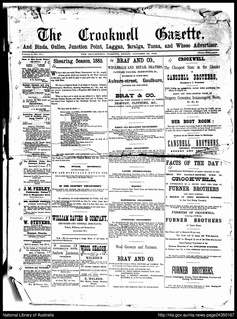
The Crookwell Gazette is an English language newspaper published in Crookwell, New South Wales, Australia. It was first published in 1885 and was also known as "The Crookwell Gazette and Binda, Golspie, Cullen, Laggan, Peelwool, Taralga, Tuena and Wheeo Advertiser", and as "The Crookwell Gazette and Settlers' Advocate".
Australian Community Media (ACM) is a media company in Australia responsible for over 160 regional publications. Its mastheads include the Canberra Times, Newcastle Herald, The Examiner, The Border Mail, The Courier and the Illawarra Mercury along with more than one hundred community-based websites across Australia and numerous agricultural publications including The Land and Queensland Country Life.
The Eyre Peninsula Tribune was a weekly newspaper published in Cleve, South Australia, founded in late 1910 and published from March 1911 to April 9, 2020. From 1911 to 1950 it was titled Eyre's Peninsula Tribune, reflecting a time when South Australia's peninsulas were referred to using possessives. It was later sold to Rural Press, previously owned by Fairfax Media, but now an Australian media company trading as Australian Community Media.













